This article delves into essential hotel and marketing strategies designed to boost bookings. It highlights key methods such as:
Each strategy is underpinned by evidence that demonstrates its effectiveness in enhancing online visibility, engaging potential guests, and fostering repeat business. Ultimately, these strategies contribute to increased reservations for hotels, providing actionable insights for industry professionals seeking to overcome their marketing challenges.
In an increasingly competitive hospitality landscape, hotels must adopt innovative marketing strategies to capture the attention of potential guests. This article delves into seven essential techniques that can significantly enhance bookings, from leveraging digital marketing services to optimizing online visibility through SEO and social media. However, as hotels strive to stand out, a pivotal question arises: which strategies will truly resonate with today’s tech-savvy travelers and drive lasting loyalty? By exploring these techniques, hotel owners can better position themselves in the market and foster enduring relationships with their guests.
Lights On offers a comprehensive suite of digital marketing services tailored specifically for hotel and marketing professionals in the hospitality industry. These services encompass:
By leveraging these offerings, accommodations can significantly enhance their online visibility, attract more visitors, and ultimately increase reservations. Each service is meticulously customized to meet the unique needs of accommodations, ensuring that hotel and marketing initiatives are not only effective but also aligned with overarching business objectives.
To enhance online presence, hotel and marketing efforts must adopt robust SEO strategies that significantly influence their reservation potential. The key components involve:
Regularly refreshing content with local events and attractions not only maintains the website's relevance but also boosts search rankings, particularly for visitors seeking accommodations in specific regions. Employing local SEO techniques, such as:
can further amplify visibility in local search results. As Jordan Hollander observes, "When executed properly, SEO can assist your website in competing not only with your competitors but also with OTAs that are vying for the same potential visitors as you are." By focusing on these strategies, hotel and marketing can effectively elevate accommodations' online visibility and attract more visitors.
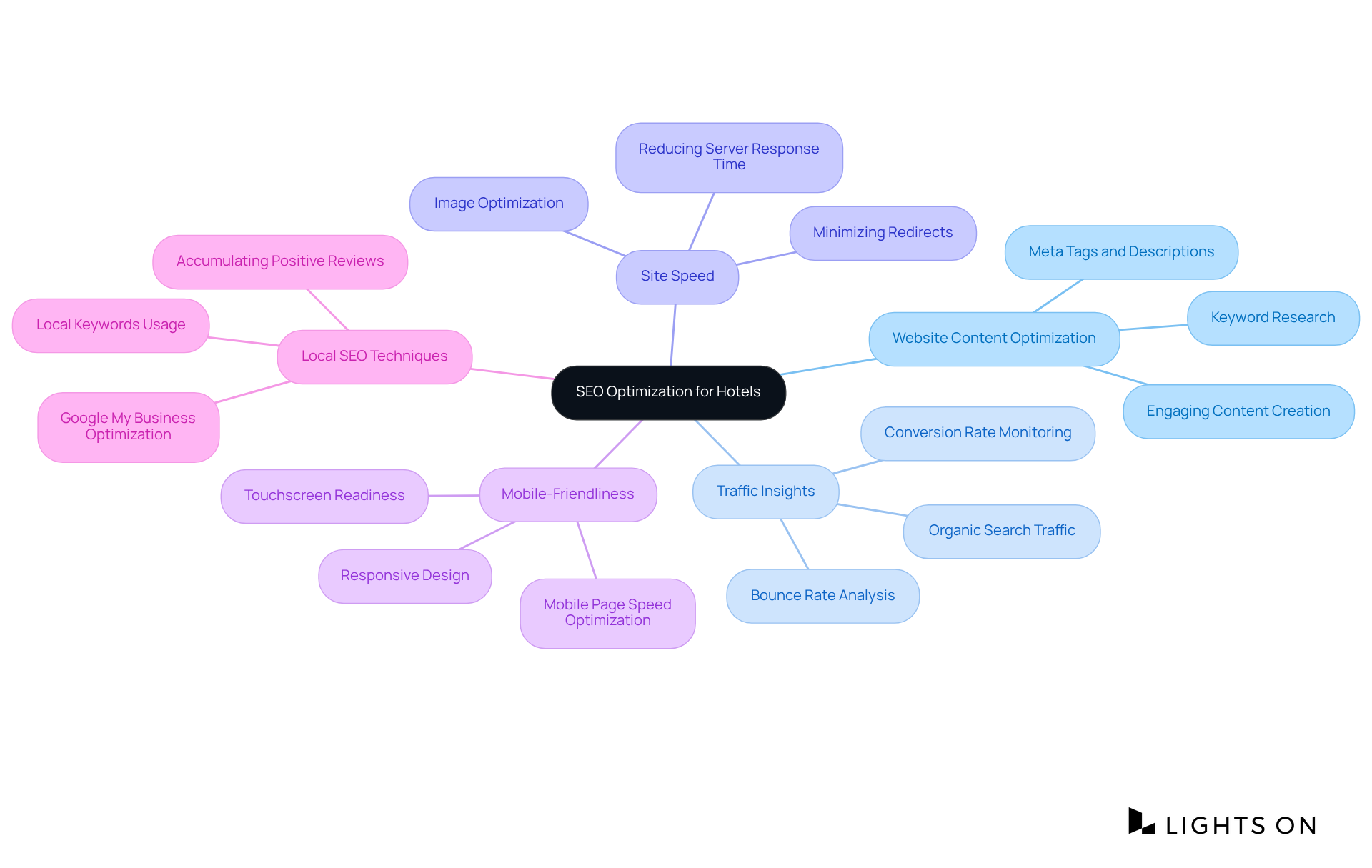
Social media promotion serves as a vital tool for hotel and marketing establishments aiming to connect with visitors and showcase their unique services. By producing visually captivating content and sharing authentic visitor experiences, hotel and marketing teams can effectively cultivate a community around their brand.
Furthermore, consistently posting updates, promotions, and behind-the-scenes content in the realm of hotel and marketing not only keeps followers engaged but also encourages them to book their stay. This strategic approach not only enhances visibility but also fosters a loyal customer base.
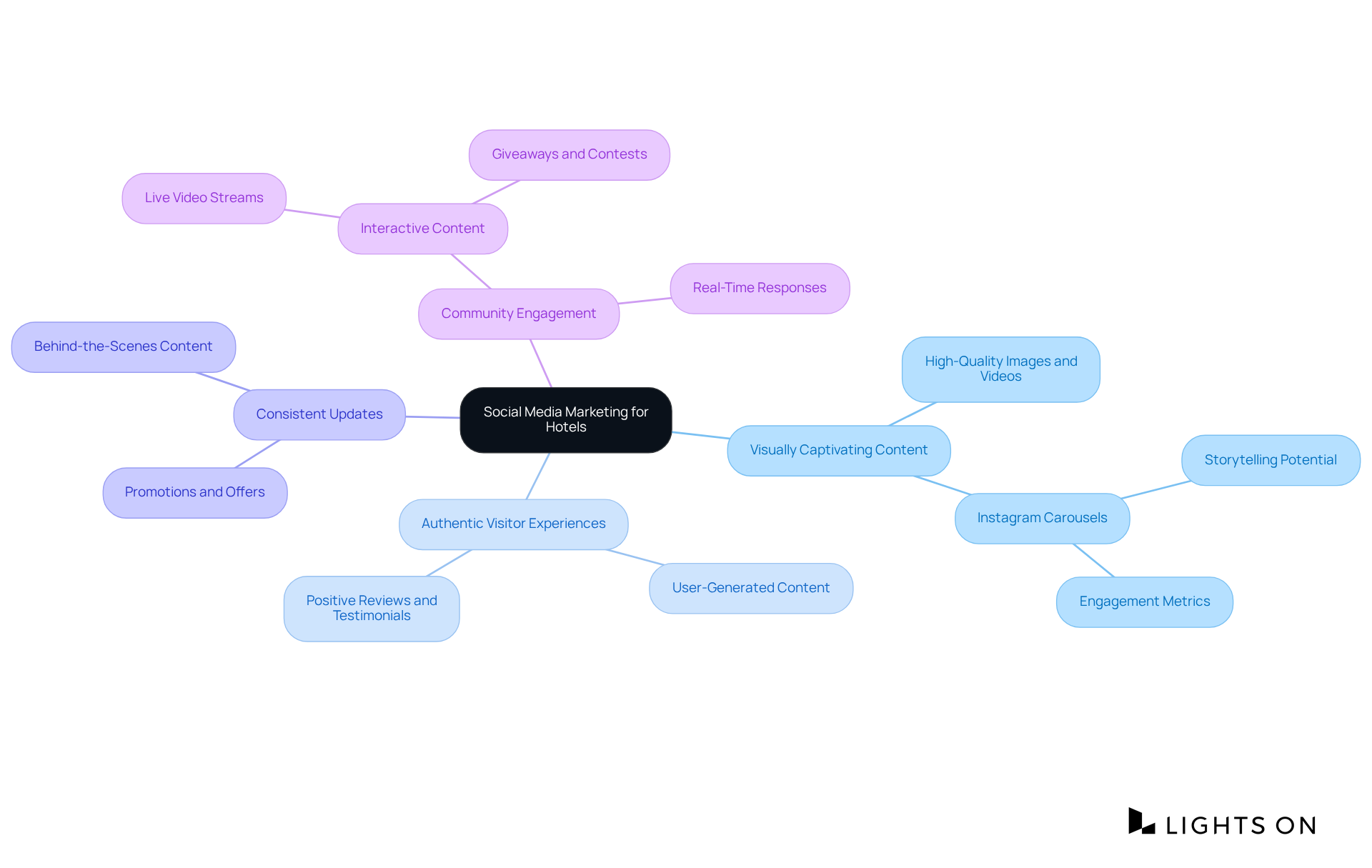
Collaborating with influencers represents a strategic approach for hotel and marketing to enhance visibility and attract new visitors. By partnering with travel bloggers and social media influencers who resonate with their brand, accommodations can engage with dedicated audiences and generate authentic content that appeals to potential guests. Research indicates that 28% of travelers book accommodations based on influencer recommendations, while 54% of Instagram users express strong trust in influencer travel content, underscoring the efficacy of this strategy.
Influencers provide genuine narratives that can significantly shape guests' perceptions and inspire them to consider a property for their next getaway. For example, the Delphin Hotel Group's recent campaign featuring seven influencers generated an impressive 8.6 million impressions, surpassing their target by 760%. This illustrates how effectively executed influencer collaborations can enhance brand visibility and drive bookings. Furthermore, 69% of consumers trust influencer recommendations, further affirming the success of such initiatives.
To fully leverage the advantages of influencer marketing, hotel and marketing accommodations must focus on selecting the right influencers. This involves evaluating potential partners based on audience demographics, engagement metrics, and alignment with the establishment's unique offerings. Marketing professionals emphasize that partnering with the wrong influencer can diminish campaign effectiveness, making it vital to identify those who genuinely resonate with the target audience.
In 2025, accommodations are increasingly turning to influencers to attract visitors by crafting personalized experiences that highlight their unique selling propositions. Influencers can showcase properties and local attractions through high-quality visuals and compelling narratives, fostering a sense of authenticity that appeals to travelers. As marketing communications specialist Debbie Miller notes, "Genuine storytelling can significantly influence potential visitors’ perceptions and willingness to book a stay."
By integrating influencer-generated content into their hotel and marketing strategies, accommodations can bolster their online presence and enhance SEO, ultimately driving more direct bookings. This approach not only increases brand visibility but also cultivates loyalty among visitors who appreciate the authentic experiences shared by influencers. Moreover, accommodations should track key metrics to assess the success of these collaborations and utilize tools like Google Analytics to refine future influencer partnerships.
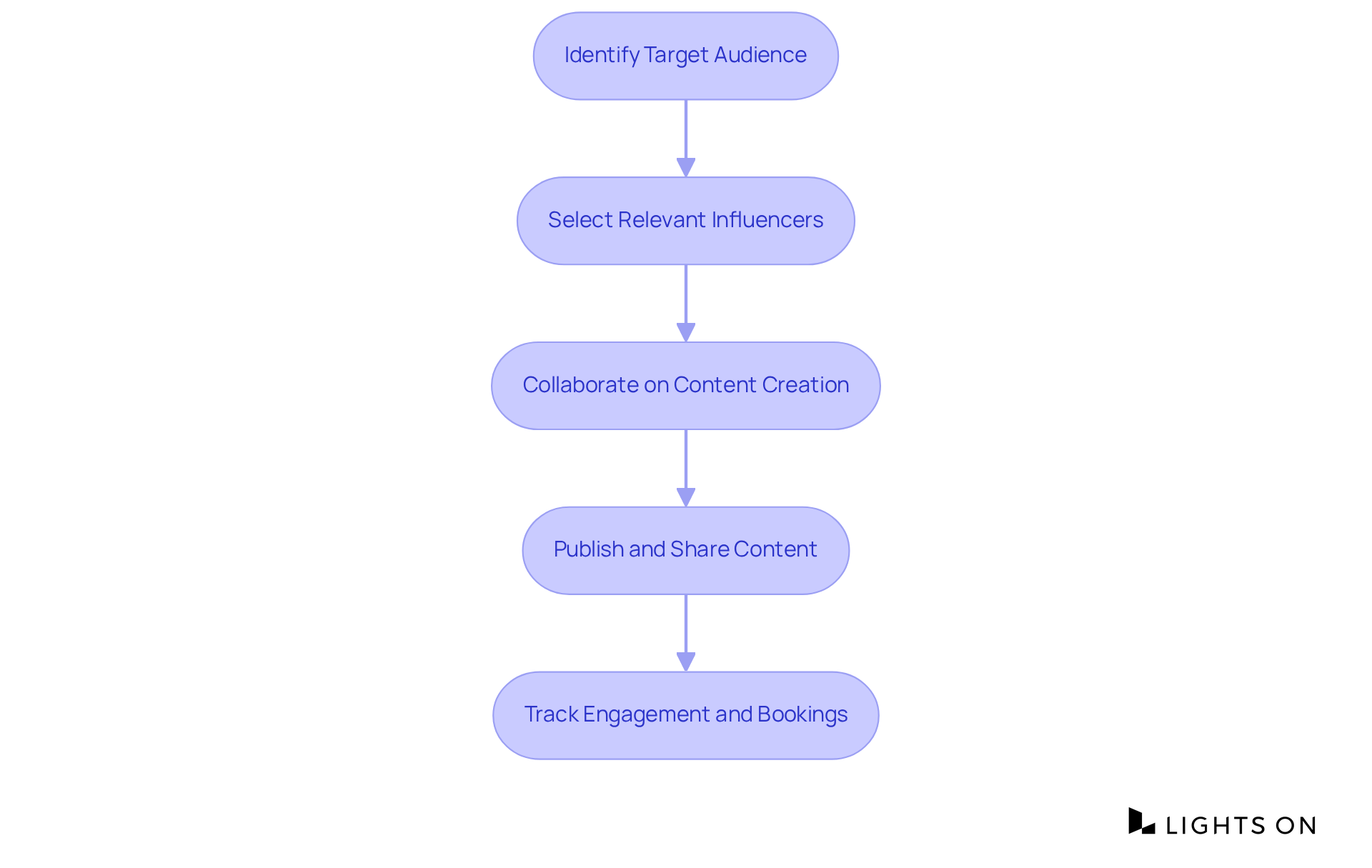
Email marketing serves as a powerful tool in hotel and marketing efforts to reconnect with past visitors and drive repeat reservations. By crafting tailored emails that showcase exclusive promotions, updates, and notifications, establishments can effectively keep their brand at the forefront of visitors' minds.
Segmenting the email list according to individual visitor preferences and behaviors significantly enhances the effectiveness of these campaigns, leading to increased engagement and conversion rates. For instance, hotel and marketing strategies that adopt personalized approaches often observe a notable rise in bookings, as customized content resonates more profoundly with recipients.
Marketing specialists underscore the importance of understanding the audience; as one expert noted, utilizing visitors' names and referencing their previous stays can foster a more engaging experience. Successful email campaigns—those that present exclusive discounts or spotlight new amenities—have demonstrated effectiveness in reigniting interest among former guests, ultimately bolstering brand loyalty and stimulating repeat visits within the context of hotel and marketing.
Furthermore, employing A/B testing for various email offers, subject lines, and designs aids in identifying the most effective engagement strategies. With email marketing yielding an average ROI of $36 for every $1 spent, the financial advantages of these strategies are substantial.
Strong calls-to-action (CTAs) in emails prompt recipients to take specific actions, such as claiming discounts or making reservations. Additionally, integrating email marketing with loyalty initiatives allows establishments to track visitor behavior and reward repeat patrons, thereby enhancing overall engagement. Consistency in branding across email templates ensures guests can instantly recognize messages, further amplifying brand visibility.
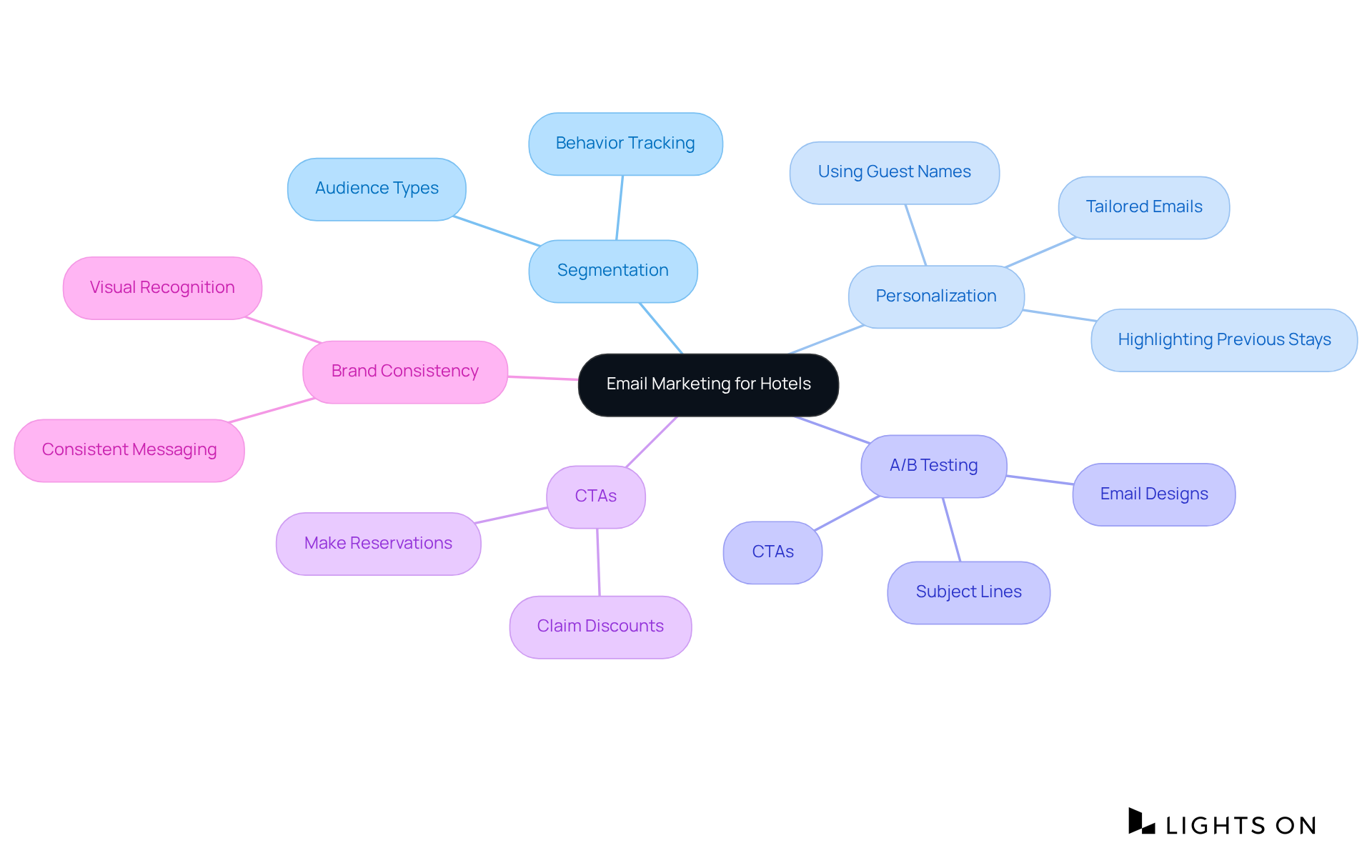
Mobile optimization is essential for accommodations aiming to attract the growing number of travelers who prefer booking on their smartphones. With 63% of global website traffic now coming from mobile devices, it is crucial for accommodation websites to be responsive, fast-loading, and easy to navigate. This focus on user experience is underscored by the fact that 71% of travelers feel anxious about securing the best deal after making reservations, highlighting the necessity of a seamless mobile experience that alleviates such concerns. Moreover, 57% of users are unlikely to recommend a site with poor mobile design, emphasizing the significant impact of user experience on brand reputation.
To streamline the reservation process, accommodations should incorporate mobile-specific features such as:
Simplifying navigation by limiting menus to four to six main items and utilizing large buttons can greatly enhance usability. Furthermore, integrating AI-driven personalization can tailor content to individual users, boosting engagement and increasing conversion rates. Given that 70% of consumers are willing to pay more for a personalized experience, leveraging these technologies can significantly drive revenue.
Effective mobile booking strategies in the hospitality sector also require:
By focusing on these factors, accommodations can not only meet the expectations of tech-savvy travelers but also position themselves competitively in a rapidly evolving market.
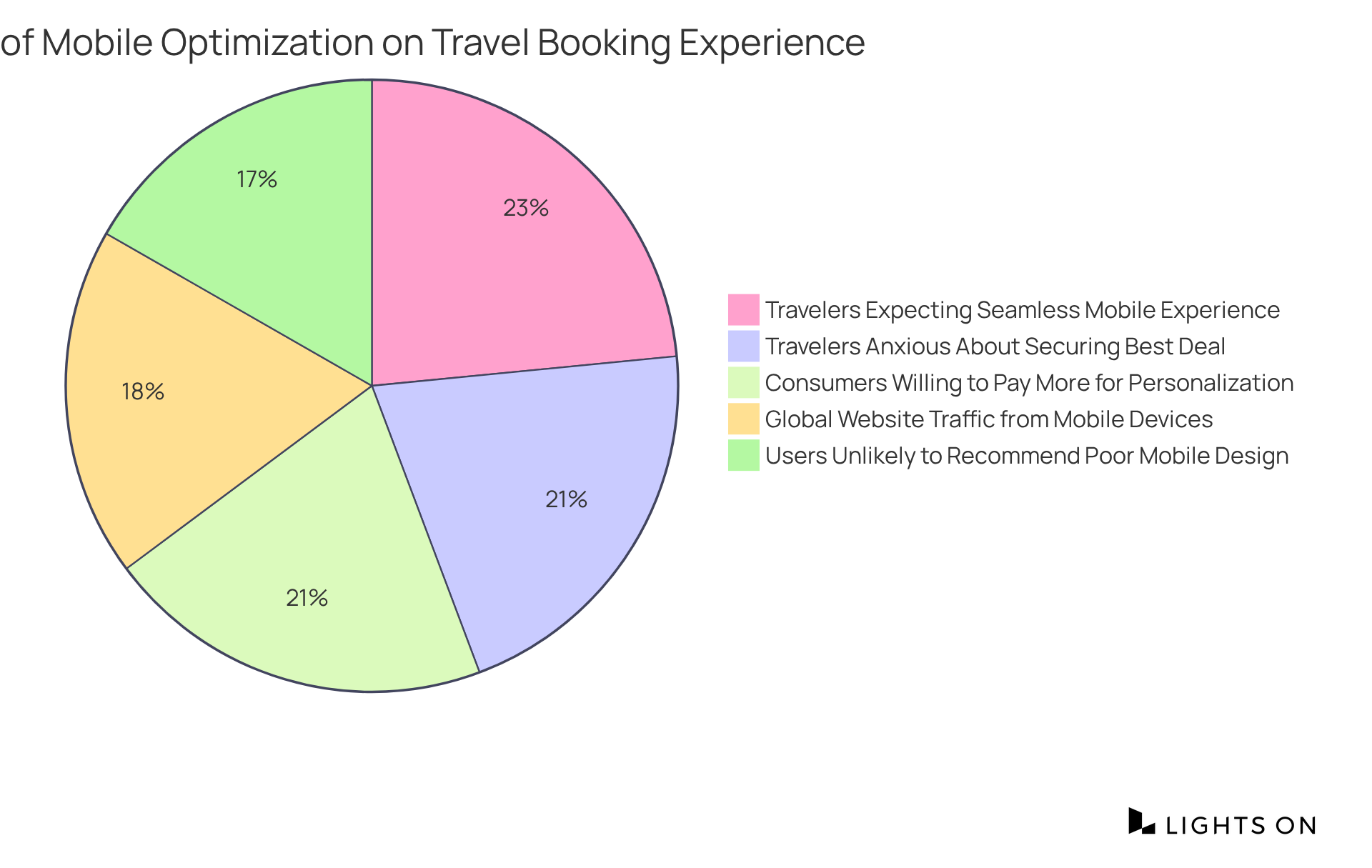
Data-focused marketing approaches are essential for hotel and marketing establishments aiming to effectively customize visitor experiences. By meticulously examining visitor data, hotel and marketing professionals can uncover individual preferences and tailor their services to meet specific needs. This strategy facilitates the development of personalized recommendations, targeted promotions, and customized communications that resonate with guests.
For instance, accommodations employing tailored upselling techniques have reported revenue growth ranging from 10% to 30%, as evidenced by various studies on AI personalization methods. Furthermore, 86% of travelers now expect customized experiences, according to Think with Google (2025), underscoring the necessity for hotel and marketing strategies to adapt accordingly.
Effective personalization tactics include:
A prime example is the Hablis Hotel in Chennai, which not only enhances visitor satisfaction but also fosters loyalty, encouraging repeat stays. As the hospitality landscape evolves, leveraging visitor data analysis will be vital in hotel and marketing to craft distinctive and memorable experiences that set accommodations apart in a competitive market.
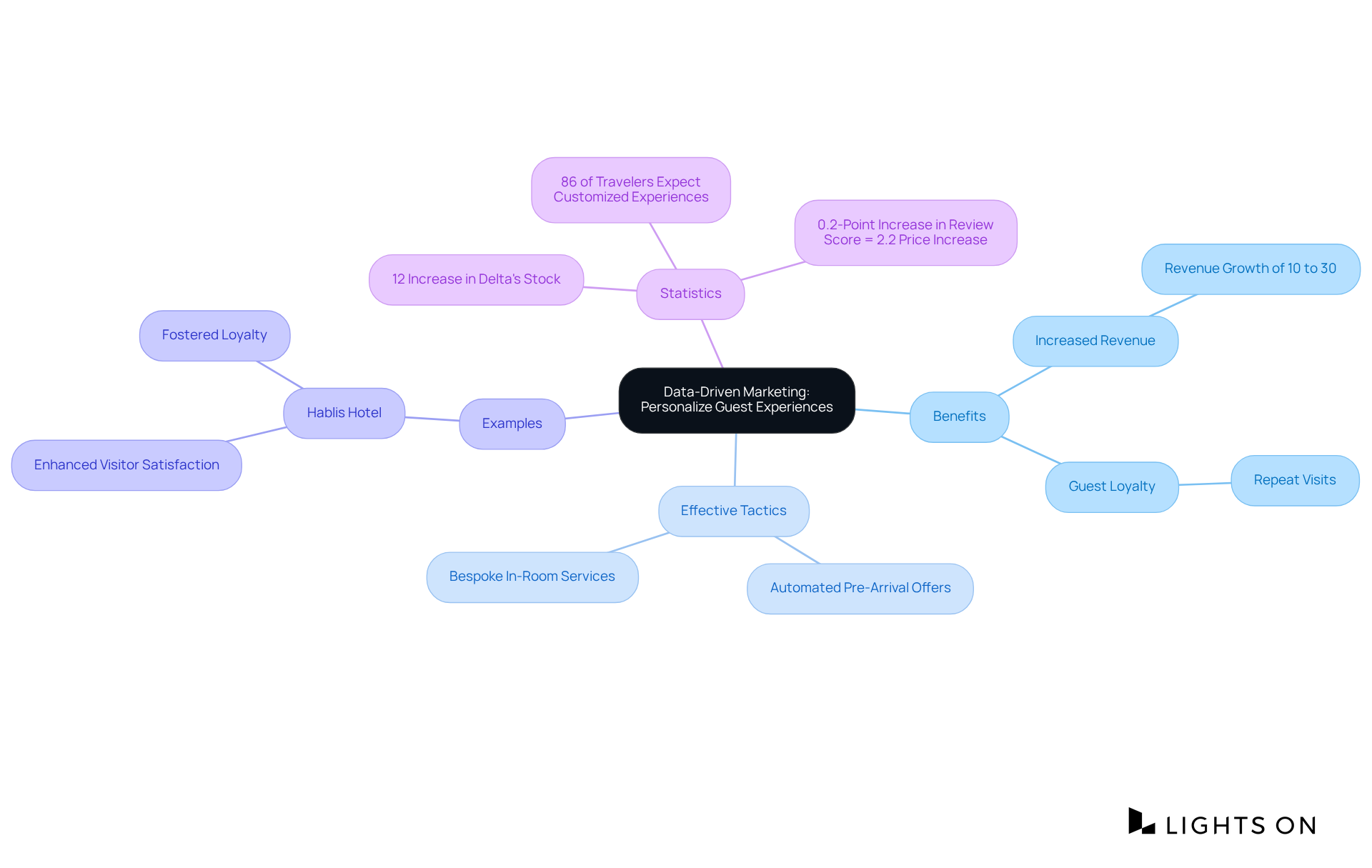
In a competitive market, creating distinctive offerings is essential for accommodations aiming to stand out. By providing customized experiences—whether romantic escapes, family bundles, or adventure packages—hotels can effectively appeal to specific visitor demographics. Furthermore, promoting these tailored packages through diverse hotel and marketing channels not only enhances visibility but also drives bookings, positioning accommodations for greater success.
Utilizing metasearch techniques is essential for improving an establishment's visibility in a competitive market. By appearing on prominent metasearch engines, establishments can connect with travelers who are actively comparing accommodation options. Successful listings are defined by precise information, competitive pricing, and visually attractive content, which together enhance traffic to the establishment's website and boost the chances of direct bookings. In fact, metasearch can account for 5-15% of total online revenue for accommodations, and it has achieved a remarkable 20:1 return on ad spend (ROAS), underscoring its importance in a comprehensive marketing approach.
As the landscape evolves in 2025, establishments that prioritize metasearch will not only enhance their visibility but also regain customer relationships previously dominated by online travel agencies (OTAs), which often bid against brand names on metasearch platforms. Digital marketing specialists highlight that a strong metasearch approach in hotel and marketing enables accommodations to compete directly with OTAs, ensuring that travelers view and reserve the establishment's official direct rates. As Kerrigan Flynn observes, "Without a well-executed transition plan, you risk losing visibility and control—leading to more OTA bookings and increased acquisition costs."
By optimizing their listings and utilizing multiple metasearch platforms, hotel and marketing efforts can enhance conversion rates and reduce acquisition costs, ultimately driving revenue growth. Hotel proprietors are urged to frequently assess and enhance their metasearch listings to conform with these approaches.
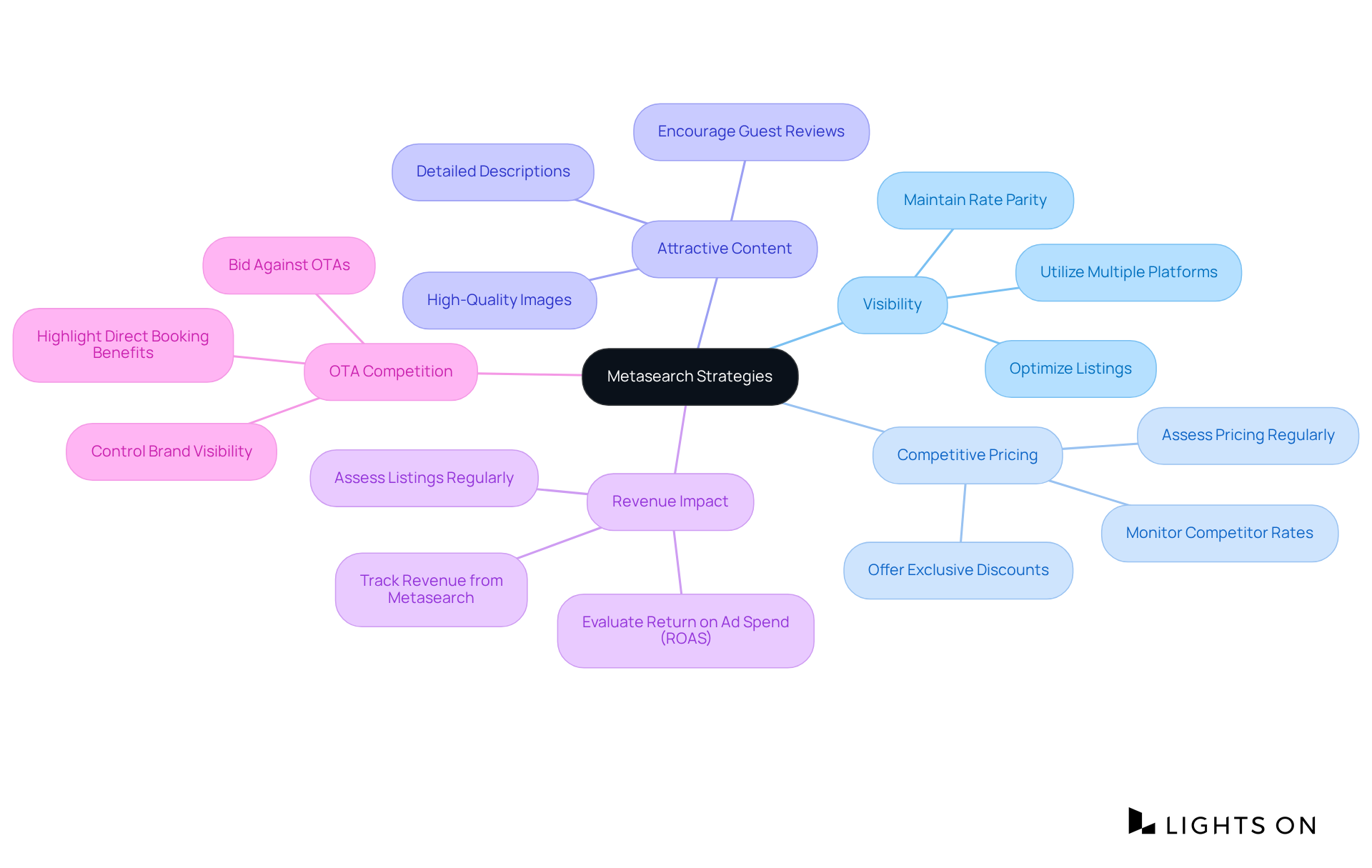
Implementing a loyalty program stands as a formidable strategy in hotel and marketing for fostering repeat business and enhancing customer loyalty in the hospitality sector. By offering rewards, discounts, and unique advantages, accommodations can effectively encourage visitors to return.
Studies indicate that loyalty schemes significantly influence consumer behavior, with:
To maximize participation, it is essential to promote the loyalty program through multiple channels, including:
This multi-faceted approach in hotel and marketing not only raises awareness but also fosters engagement, ultimately driving more bookings and enhancing overall visitor satisfaction.
Effective loyalty programs, such as Marriott Bonvoy, boasting 228 million members and representing over half of occupied accommodations, exemplify the potential for increased repeat business and customer retention. By aligning loyalty offerings with guest preferences and values, hotel and marketing strategies can create a compelling reason for guests to choose them repeatedly, ensuring long-term success in a competitive market.
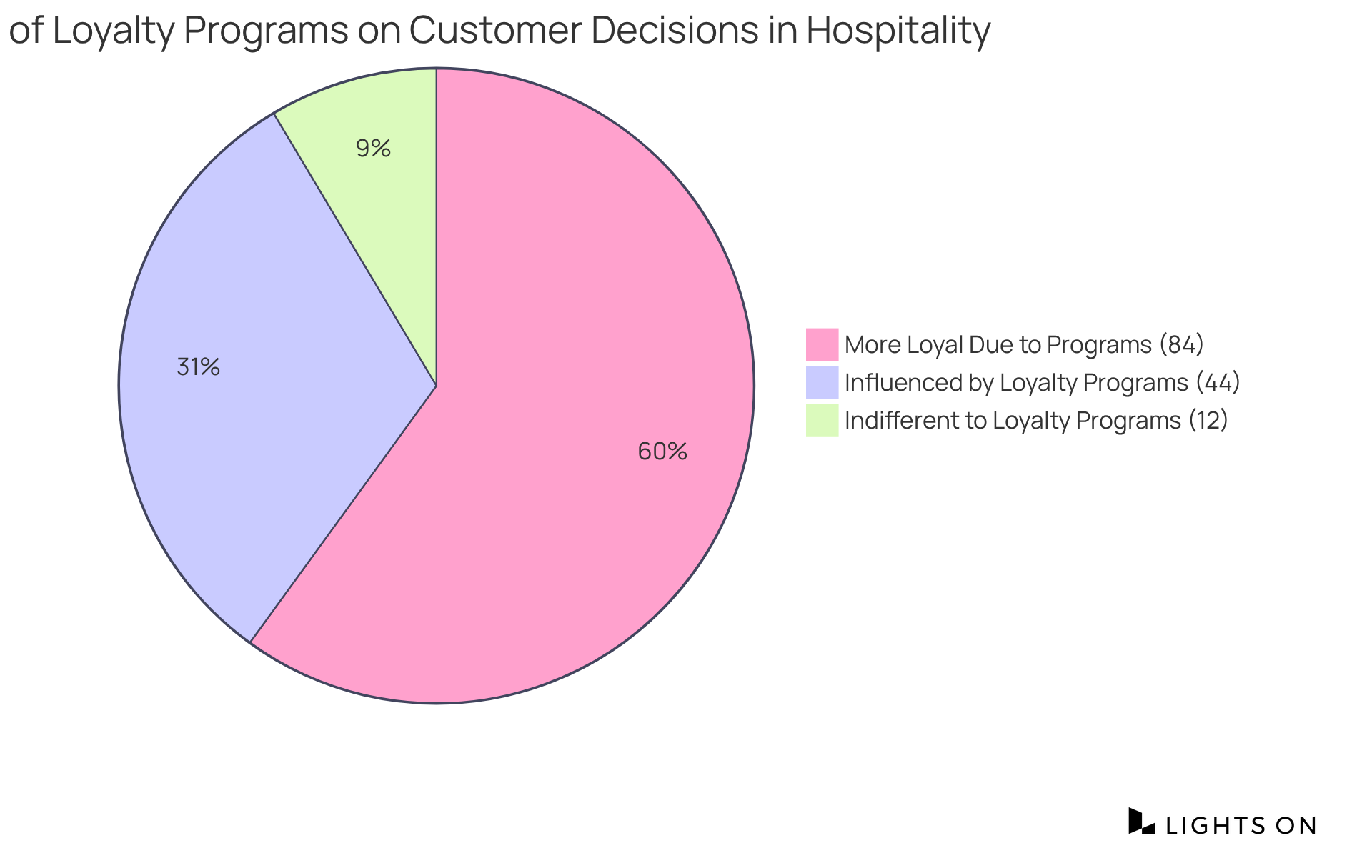
Implementing effective hotel marketing strategies is crucial for boosting bookings and enhancing visibility in a highly competitive market. By leveraging a combination of digital marketing services, SEO optimization, social media engagement, and influencer collaborations, accommodations can attract more guests and drive direct reservations. Each strategy discussed emphasizes the importance of understanding guest preferences and behaviors, ensuring that marketing efforts are not only targeted but also personalized to create memorable experiences.
The article outlines key tactics such as:
Additionally, the significance of loyalty programs is highlighted, showcasing how they can foster repeat business and strengthen customer relationships. By integrating these strategies, hotels can effectively position themselves to compete with online travel agencies and enhance their overall revenue potential.
Ultimately, the hospitality industry must embrace these essential marketing strategies to thrive in 2025 and beyond. By focusing on innovative approaches and maintaining a strong online presence, accommodations can not only meet the evolving expectations of travelers but also cultivate lasting connections that drive loyalty and repeat visits. Taking action on these insights can lead to substantial growth and success in the competitive landscape of hotel marketing.
What digital marketing services does Lights On offer for hotels?
Lights On offers a comprehensive suite of digital marketing services tailored for the hospitality industry, including website and content management, performance marketing, social media management, search engine marketing, and website design.
How can these services benefit hotels?
By leveraging these services, hotels can enhance their online visibility, attract more visitors, and ultimately increase reservations. Each service is customized to meet the unique needs of accommodations.
What are the key components of an effective SEO strategy for hotels?
Key components include optimizing website content with relevant keywords, ensuring fast-loading pages, maintaining a mobile-friendly design, and regularly refreshing content with local events. Additionally, local SEO techniques such as optimizing Google My Business listings and accumulating positive reviews are important.
Why is SEO important for hotels?
SEO is crucial as over 50% of website traffic comes from organic search result clicks. Effective SEO strategies significantly influence a hotel's reservation potential and help compete with competitors and online travel agencies (OTAs).
How can social media marketing benefit hotels?
Social media marketing helps hotels connect with visitors and showcase their unique services. By producing visually captivating content and sharing authentic visitor experiences, hotels can cultivate a community, keep followers engaged, and encourage bookings.
What types of content should hotels post on social media?
Hotels should post updates, promotions, behind-the-scenes content, and visually captivating material to engage followers and showcase their offerings effectively.
Transform your group booking strategies with Lights On and watch your occupancy soar.